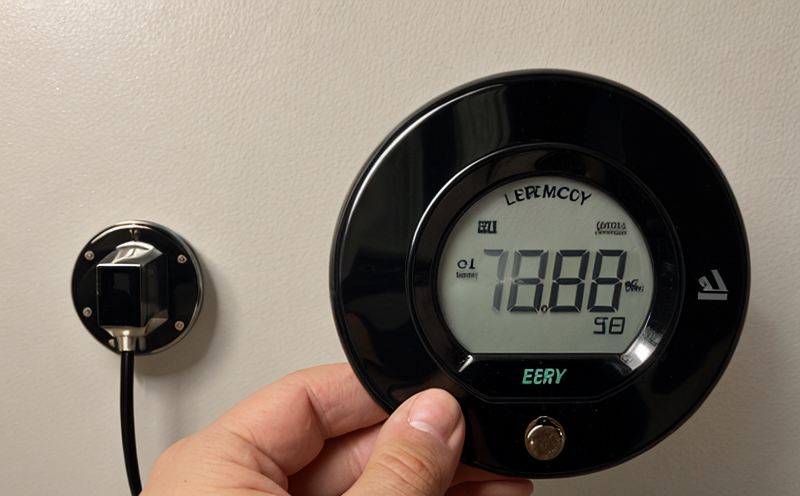EN 303 5 Energy Efficiency Testing for Heating Boilers
The European standard EN 303-5:2014, which specifies the methodology for determining energy efficiency in heating boilers, is a cornerstone of compliance and quality assurance within the electronics sector. This standard ensures that heating appliances meet stringent requirements set by the European Union to promote energy savings and reduce greenhouse gas emissions. The scope of this test encompasses a wide range of products, including domestic boilers, industrial heaters, and other devices designed for heat generation.
Heating systems are one of the largest contributors to global energy consumption. According to reports from the International Energy Agency (IEA), residential heating accounts for nearly 40% of total final energy consumption in many countries. Therefore, optimizing these systems is crucial not only for reducing operational costs but also for contributing to environmental sustainability goals.
The testing process outlined by EN 303-5 involves a series of laboratory measurements aimed at evaluating the actual performance of heating boilers under defined operating conditions. These tests simulate real-world scenarios to ensure that the equipment will perform as expected in various environments and load conditions. Key parameters measured include input power, output heat energy, efficiency levels, and heat loss factors.
Specimen preparation for this test typically involves selecting a representative sample of the heating boiler model being tested. The specimen must be clean and free from any defects that could affect its performance during testing. Once prepared, the equipment is installed in a controlled laboratory environment where it can undergo rigorous testing according to predefined procedures.
Instrumentation plays a critical role in conducting accurate measurements throughout this process. High-precision thermocouples, power meters, flow sensors, and calorimeters are commonly used tools for recording data related to heat generation, consumption, and distribution. Software systems integrated into these devices help automate data collection and analysis, ensuring consistency across multiple tests.
The results from EN 303-5 testing provide manufacturers with valuable insights into how efficiently their products operate compared to industry benchmarks. Compliance with this standard ensures that heating boilers meet minimum efficiency requirements set forth by EU regulations. By adhering to these standards, companies can enhance product quality while simultaneously contributing towards broader sustainability objectives.
In practice, many organizations choose to partner with accredited laboratories specializing in electronics testing when conducting EN 303-5 assessments due to the complexity involved in setting up proper facilities and ensuring accurate results. Partnering with experts allows businesses to focus on innovation rather than regulatory compliance, ultimately leading to more efficient products that better serve consumer needs.
To summarize, EN 303-5:2014 provides a robust framework for assessing energy efficiency in heating boilers through standardized testing methods. Its implementation helps drive down operational costs while promoting environmental responsibility among manufacturers and end-users alike.
- Better Insights into Product Performance: Accurate measurement of key performance indicators (KPIs) such as input power, output heat energy, and efficiency levels.
- Compliance with EU Regulations: Ensures adherence to mandatory standards for energy-efficient appliances in the European market.
- Informed Decision Making: Provides clear data points that inform product development strategies aimed at improving overall efficacy.
- Enhanced Reputation: Demonstrates commitment to sustainability and environmental stewardship, appealing to eco-conscious consumers.
Why It Matters
The importance of EN 303-5:2014 cannot be overstated given the increasing focus on reducing carbon footprints and promoting sustainable practices across industries. By ensuring that heating boilers meet energy efficiency standards, this standard directly contributes to lowering overall energy consumption worldwide.
From an economic perspective, compliance with EN 303-5 can lead to significant savings for both manufacturers and consumers alike. For businesses, it reduces operational costs associated with producing more efficient products. On the consumer side, lower-priced appliances that consume less electricity translate into reduced utility bills over time.
Moreover, meeting these standards fosters innovation within the industry by encouraging companies to explore new materials and technologies capable of achieving higher efficiencies without compromising on safety or reliability.
The broader impact extends beyond individual organizations; when collectively implemented across multiple sectors, such measures contribute significantly towards achieving global climate targets. As governments continue pushing for stronger environmental policies globally, adherence to standards like EN 303-5 becomes increasingly important not just from a regulatory standpoint but also as part of broader corporate social responsibility initiatives.
In conclusion, the significance of EN 303-5:2014 lies in its ability to balance economic viability with environmental responsibility, making it essential for any company involved in designing or manufacturing heating boilers.





